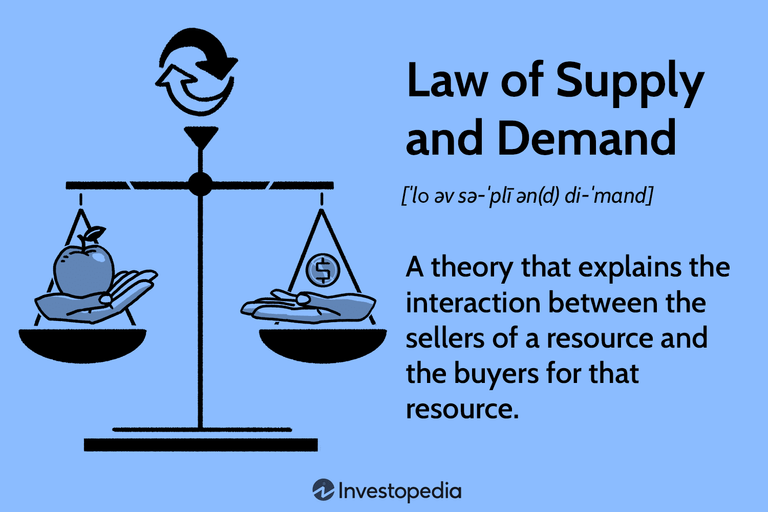
The Importance of Supply
In Wealth and Poverty, Gilder begins chapter 4 by showcasing the importance of ‘supply’ in the economy. He references how many are always talking about the importance of demand, however, supply is exceptionally important as well. An entrepreneur can create supply and hence desire by taking a bet on something being desirable in the future. The entrepreneur does not know with complete certainty if the population will desire their product, service, etc… so they take the risk of being wrong by committing. There is no demand for unknown goods in the market. The job of an entrepreneur is to create the supply of those goods and ideally make them desirable, hence promoting demand. A wonderful example of this is when Steve Jobs created the iphone. People did not know they wanted a smartphone until Steve presented his creation to them, after completing years of work to build it. Steve could have been completely wrong with his bet that people would find the iPhone desirable, yet he struck the jack-pot with his invention and the rest is history. The above example ties perfectly with Gilder’s initial claims, as it highlights the importance of supply in the economic hierarchy. There was plenty of demand for mobile phones when Steve decided to invent the iPhone, but there was no demand for a smart phone until he showed the world what he had built. If the market only focused on increasing demand, rather than supply, we would still be stuck with Blackberrys.
Perfect competition is neither beneficial nor attainable
One of the most memorable portions of chapter 4 was the introduction to the concept of “perfect competition.” I found the author’s viewpoint on the topic to be very interesting and was something that I have never thought of. Gilder claims,
“As has been often observed in academic analyses, perfect competition actually comes to mean no competition at all: an equilibrium in which all participants have perfect information and in which companies can change neither prices nor products and can essentially affect neither supply nor demand (Gilder, 2012, P. 4).”
I found this perspective to be fascinating, as I was always taught in economic classes that the best-case scenario for the economy would be a form of perfect competition. It makes sense that perfect competition would be ineffective, as there would be no room for improvement or changes to supply and demand in the economy. It also must be noted that perfect competition is impossible to achieve, as there are always changes being made in the economy and world as a whole. There always will be gaps of information between consumers and entrepreneurs and therefore potential for arbitrage. Nevertheless, I found Gilder’s opinion on this topic to be refreshing, since the classic view of utopian thought is geared towards a “perfect” form of competition–A harmful and unattainable practice.
Monopolies and their potential benefits
An additional thought that Gilder discussed, that I found to be fascinating, was in regards to the concept of monopolies. In the chapter, an economist named Arthur Laffer was mentioned. Arthur claims that there only needs to be one company in an industry to be competitive. Initially, I thought this was a false statement, yet was surprised to agree with the statement following his claim. Arthur assessed that a single company in an industry will always compete against the threat of future companies entering the space and taking it over. The only way a monopoly can be preserved is by keeping the price low enough to exclude other forms of competition. Although the sheer size of a monopoly may deter potential competition, the consumer wins in the end, because the monopoly must keep prices low. If the company does not keep prices low, then someone else will come in and provide a cheaper alternative. The consumer eventually wins in both scenarios. It is seemingly common practice to believe monopolies are bad for the market, and there may be some truth to this in regards to illegal practices and lobbying, however, a company like Amazon can only keep its spot if it is benefitting the consumer more than any other e-commerce company. The only way to benefit consumers more than other companies is to provide the best and cheapest goods. The author even mentions “Gilder (2012, p. 14) that occasionally, throughout history, a company like IBM or Polaroid will find such a goldmine and exploit it so well that it is dominant for a very long time, which is in the best interest of the country.” I agree with this viewpoint, as the best products on the market were IBM’s computers for a long time. Until an entrepreneur can create a more superior product, it is in the consumer’s best interest to continually support IBM. This is exactly what happened until Microsoft and Apple took over. The cycle will continue and another company will create something even greater than Microsoft and Apple in the future. The end beneficiary is the consumer, as they reap the rewards of innovation. If there is no creation of something new to supply to consumers, then the market stays stagnant with the current product.
Conclusion
Overall, the further change of the economic landscape for the better is a direct result of
entrepreneurs creating supply, even if they do not know with complete certainty there will
be demand. This practice is risky, yet has allowed the world to continuously improve across
time. Without the creativity to create supply, the world would be stuck with the same goods
and services, which is not in the best interest of society.
Sources:
Gilder, G. F. (2012). Chapter Four: The Supply Side. In Wealth and poverty (pp. 51–74). essay, Regnery Publishing, Inc.
